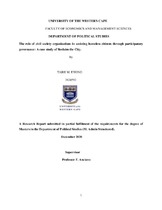| dc.description.abstract | This study investigates how a civil society organisation, Reclaim the City (RTC), based in the old Woodstock Hospital is attempting to address the plight of the homeless through deepening participatory governance. Homelessness is a growing concern in South Africa. Post-1994 the African National Congress (ANC) embarked on the Reconstruction and Development Program (RDP) to address the imbalances of the past through providing housing, water, electricity and sanitation amongst others. However by 1996 this program was decommissioned and replaced by the Growth, Employment, and Reconstruction (GEAR) policy which ushered in the privatisation of basic services. The challenge was that many of the previously marginalised could not pay for these services. The move away from the RDP meant residents had to pay for housing and when many could not pay their rents they were evicted. The evicted moved into the streets and later, in this case study, to the old Woodstock Hospital. In their new location, they started engaging with Development Action Group (DAG) and Ndifuna Ukwazi (NU) and the City of Cape Town to address their plight. | en_US |

